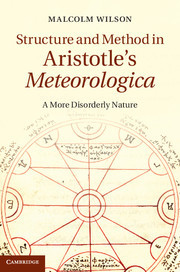Description
Structure and Method in Aristotle's Meteorologica
A More Disorderly Nature
Author: Wilson Malcolm
This book decodes the Meteorologica and shows how it provides the key to understanding Aristotle's natural philosophy.
Language: English
Subject for Structure and Method in Aristotle's Meteorologica:
Approximative price 77.68 €
In Print (Delivery period: 14 days).
Add to cart
Structure and Method in Aristotle's Meteorologica
Publication date: 12-2013
315 p. · 15.8x23.5 cm · Hardback
Publication date: 12-2013
315 p. · 15.8x23.5 cm · Hardback
Structure and Method in Aristotle's Meteorologica
Publication date: 03-2016
Support: Print on demand
Publication date: 03-2016
Support: Print on demand
Description
/li>Contents
/li>Biography
/li>
In the first full-length study in any modern language dedicated to the Meteorologica, Malcolm Wilson presents a groundbreaking interpretation of Aristotle's natural philosophy. Divided into two parts, the book first addresses general philosophical and scientific issues by placing the treatise in a diachronic frame comprising Aristotle's predecessors and in a synchronic frame comprising his other physical works. It argues that Aristotle thought of meteorological phenomena as intermediary or 'dualizing' between the cosmos as a whole and the manifold world of terrestrial animals. Engaging with the best current literature on Aristotle's theories of science and metaphysics, Wilson focuses on issues of aetiology, teleology and the structure and unity of science. The second half of the book illustrates Aristotle's principal concerns in a section-by-section treatment of the meteorological phenomena and provides solutions to many of the problems that have been raised since the time of the ancient commentators.
Introduction; 1. The rebirth of meteorology; 2. From elements to exhalations; 3. The exhalations; 4. The biological method; 5. Teleology in the Meteorologica; 6. Kapnosphere; 7. Condensation and precipitation (1.9-12); 8. Fresh waters (1.13-14); 9. The sea (2.1-3); 10. Winds (2.4-6); 11. Earthquakes and stormy phenomena (2.7-3.1); 12. Reflections (3.2-6); 13. Minerals and metals.
Malcolm Wilson is Associate Professor of Classics at the University of Oregon. He is author of Aristotle's Theory of the Unity of Science (2000) and numerous articles on ancient philosophy and science.
© 2024 LAVOISIER S.A.S.
These books may interest you

Aristotle's PhysicsA Critical Guide 106.56 €



